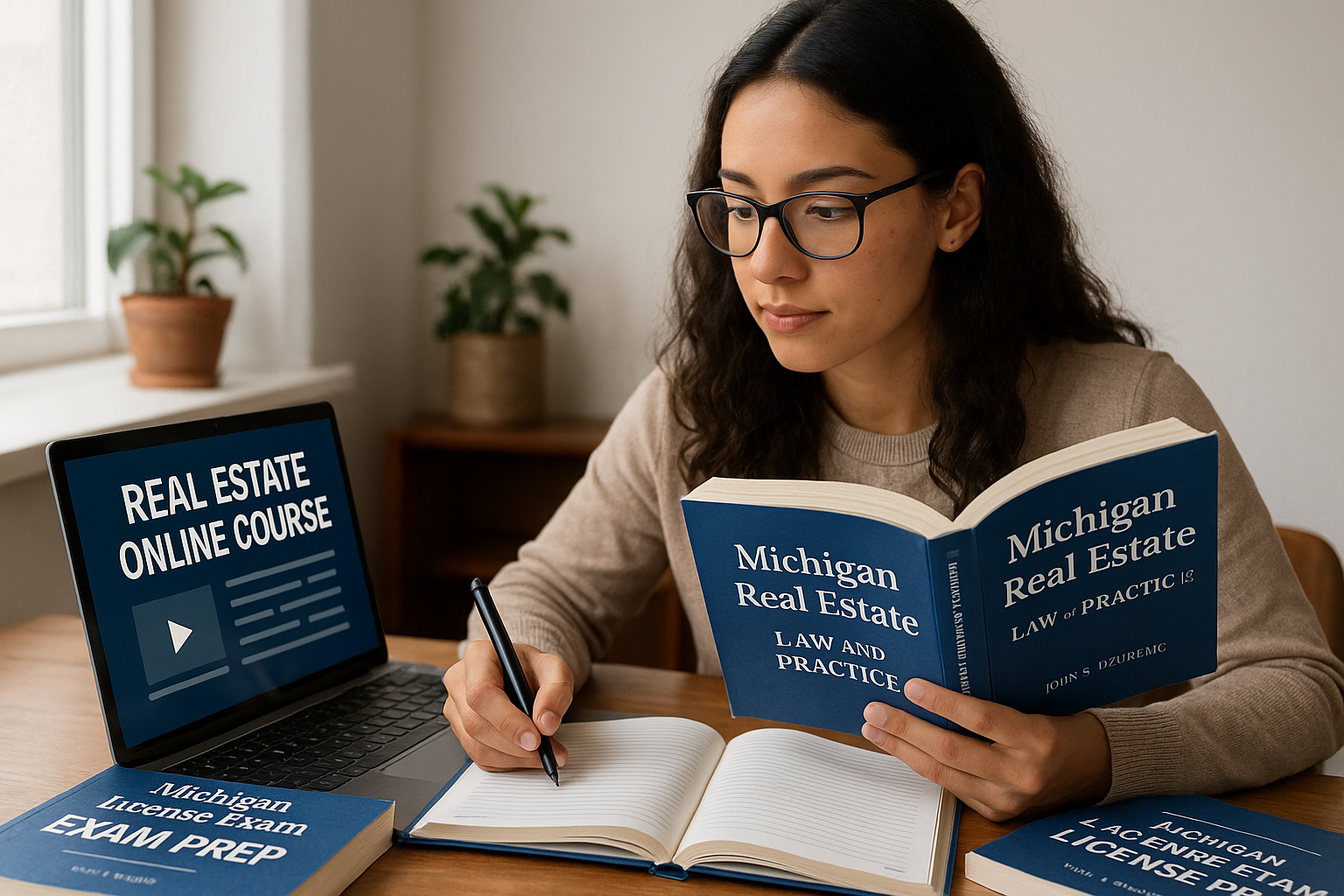Michigan’s real estate licensing landscape is governed by Article 25 of Public Act 299 of 1980, which established the framework for licensing and regulating real estate brokers and salespersons in the state. While Article 25 of Public Act 299 of 1980, as amended was created, to license and regulate the practice of real estate brokers and salespersons in Michigan, the path to success involves much more than meeting basic regulatory requirements.
Understanding how to become a real estate agent in Michigan requires looking beyond the surface-level licensing steps that everyone talks about. I’ve watched countless new agents get their licenses and then struggle for months because they focused on the wrong things during their preparation phase.
Table of Contents
-
The Mental Game That Makes or Breaks New Agents
-
Rewiring Your Brain from Buyer to Professional
-
Building Your Network Before You Need It
-
Stacking Skills That Actually Matter
-
-
The Licensing Process Nobody Talks About Honestly
-
Timing Your Entry for Maximum Impact
-
Choosing Education That Sets You Apart
-
Mastering the Exam Psychology Game
-
-
Surviving Your First Year When Others Don’t
-
The Real Financial Picture You Need to Face
-
Building a Client Machine That Actually Works
-
Fast-Tracking Your Expertise Development
-
-
The Technology Revolution Changing Everything
-
Creating Your Digital Marketing Empire
-
Managing Relationships at Scale
-
Making Data-Driven Decisions That Count
-
TL;DR
Your mindset shift from consumer to professional determines long-term success more than licensing requirements. Building relationships before getting licensed creates a foundation most agents spend years trying to establish. Strategic timing of your license application can dramatically impact your first-year success.
Plan for 18 months of expenses – the income delay is longer than most people expect. Technology mastery isn’t optional anymore – it’s what separates thriving agents from struggling ones. Geographic farming and sphere of influence activation are your fastest paths to consistent income.
Choosing the right education provider affects more than just passing the exam. Developing complementary skills during licensing gives you immediate competitive advantages.
The Mental Game That Makes or Breaks New Agents
Most people focus on the technical requirements of becoming a real estate agent, but the psychological transformation from consumer to professional is what actually determines whether you’ll succeed or join the 80% who quit within two years. This mental shift involves rewiring how you think about property, people, and your role in major life decisions.
You’ll need to develop professional empathy while maintaining analytical distance, build strategic relationships before you’re licensed, and view your license as just the foundation of a broader professional portfolio rather than the end goal.

Rewiring Your Brain from Buyer to Professional
The biggest challenge new agents face isn’t learning contracts or market analysis – it’s shifting from thinking someone who buys and sells property occasionally to someone who guides others through these decisions professionally. This transformation requires identifying your personal biases about real estate, developing the ability to understand client emotions without getting emotionally attached yourself, and learning to see properties through market psychology rather than personal preferences.
Breaking Free from Your Own Property Experiences
Your personal experiences buying or selling property can either be your greatest asset or your biggest blind spot as an agent. The key is documenting these experiences before you start your education, identifying emotional triggers that could cloud your professional judgment, and creating a “bias inventory” that you can reference throughout your career to maintain objectivity when helping clients.
Before you dive into real estate education, I want you to do something most people skip entirely. Sit down and write out every property transaction you’ve ever been involved in – buying, selling, renting, even helping family members. What frustrated you? What excited you? What decisions do you regret?
This isn’t just a trip down memory lane. These experiences shape how you’ll react to client situations, and if you’re not aware of your triggers, they’ll sabotage your professional judgment. Did you fall in love with a house that was completely wrong for your budget? You might push clients toward “dream homes” they can’t afford. Were you burned by a pushy agent? You might be too passive when clients need firm guidance.
Create what I call a “bias inventory” – a simple document listing your emotional triggers around real estate. Update it as you gain experience. When you’re working with clients and feel a strong emotional reaction to their decisions, check your inventory. Is this about what’s best for them, or are you projecting your own experiences?
Sarah, a new agent in Grand Rapids, realized during her bias inventory that she had strong negative feelings about condominiums because her first condo purchase involved unexpected HOA fees. When working with a young professional who was excited about a downtown condo, she initially found herself steering him toward single-family homes. After checking her bias inventory, she recognized her personal trigger and refocused on what made sense for his lifestyle and budget. The client purchased the condo and later referred three colleagues to Sarah because she helped him find exactly what he needed.
Mastering Professional Empathy Without Emotional Baggage
Professional empathy means understanding and connecting with client emotions while maintaining the analytical distance necessary to provide sound advice. This skill requires practice in active listening without offering immediate solutions, learning to validate feelings without agreeing with poor decisions, and developing the ability to guide clients through emotional decisions using logic and market data.
Here’s something they don’t teach in real estate school: your job isn’t to be your clients’ therapist, but you can’t succeed without understanding the emotional undercurrents driving their decisions. Buying or selling a home is rarely just about the property – it’s about life transitions, family dynamics, financial fears, and dreams for the future.
Start practicing this skill now, before you’re licensed. When friends or family members talk about major life decisions (real estate or otherwise), focus entirely on understanding their underlying motivations without jumping in with advice. Ask questions: “What’s driving that feeling?” or “Help me understand what’s most important to you about this decision.”
The goal is to become someone who can sit with other people’s emotions without taking them on yourself. You’ll need to validate a seller’s attachment to their childhood home while helping them price it realistically for the market. You’ll need to understand a buyer’s excitement about a property while pointing out potential issues they’re overlooking.
This emotional intelligence becomes your competitive advantage. Clients will trust you more, refer you more often, and stick with you through difficult transactions because they feel understood – never judged.

Building Your Network Before You Need It
Most new agents start building relationships after they get licensed, which puts them months or years behind agents who began networking during their education phase. Strategic pre-license networking involves mapping your existing relationships for potential clients and referral sources, positioning yourself in community roles where real estate decisions are discussed, and building relationships with established industry professionals who can become mentors and referral partners.
Mapping Your Hidden Client Gold Mine
Your existing network contains more potential clients and referral sources than you realize, but most people don’t systematically identify and cultivate these relationships. This process involves creating a comprehensive contact list categorized by likelihood to buy or sell property, beginning casual conversations about real estate plans before you’re licensed, and positioning yourself as a knowledgeable resource rather than a salesperson.
You already know more potential clients than you think. The problem is, most people don’t realize this until they’re licensed and desperately trying to generate business. By then, reaching out feels awkward and sales-y.
Right now, while you’re still in the “thinking about real estate” phase, create a comprehensive list of everyone you know. I’m talking about everyone – family, friends, coworkers, neighbors, people from your gym, church, kids’ school activities, former colleagues, college friends you stay in touch with on social media.
For each person, ask yourself: What’s the likelihood they’ll buy or sell property in the next 2-5 years? High likelihood includes people who are newly married, recently divorced, growing families, empty nesters, job changers, or anyone who’s mentioned being unhappy with their current living situation. Medium likelihood includes people in stable situations who might move for lifestyle reasons. Even low likelihood contacts matter – they know people who will buy or sell.
Start having casual conversations about real estate now. These aren’t sales conversations – just genuine interest in their housing situations and future plans. “How are you liking the neighborhood?” “Have you thought about what you’ll do when the kids move out?” “I heard the market’s been crazy – are you thinking about making any moves?”
These conversations plant seeds. When you get licensed, you won’t be calling to announce you’re in real estate – you’ll be following up on conversations you’ve already started.
|
Contact Category |
Likelihood to Buy/Sell |
Conversation Starters |
Follow-up Timeline |
|---|---|---|---|
|
Newly Married |
High |
“How’s married life? Are you thinking about buying a place together?” |
Monthly check-ins |
|
Growing Families |
High |
“How’s the family growing? Is your current place working for everyone?” |
Quarterly updates |
|
Empty Nesters |
High |
“Now that the kids are out, are you thinking about downsizing?” |
Bi-annual contact |
|
Job Changers |
Medium |
“How’s the new job? Any thoughts about relocating?” |
Quarterly follow-up |
|
Stable Homeowners |
Low |
“How’s the neighborhood treating you?” |
Annual holiday cards |
Strategic Community Positioning That Actually Works
Volunteering and community involvement can be powerful networking tools if you choose activities where real estate decisions are naturally discussed. This means joining homeowner associations, school boards, or community development committees rather than random volunteer opportunities. The goal is to position yourself as a knowledgeable community member before you’re selling anything.
Here’s where most networking advice goes wrong: it tells you to “get involved in your community” without explaining how to choose activities strategically. Random volunteer work doesn’t create real estate opportunities.
You want to position yourself where real estate decisions are naturally part of the conversation. Homeowner association meetings are goldmines – people discuss property values, neighborhood improvements, and housing concerns. School board involvement connects you with families who might outgrow their current homes or want to move to better districts.
Community development committees, zoning meetings, and local government involvement put you in rooms with people making decisions that affect property values. You’re there to learn and contribute, but you’re also building relationships with people who see you as knowledgeable about local real estate issues.
The key is showing up consistently and adding value to these conversations. Share relevant market insights when appropriate. Offer to research property-related questions for the group. Become known as someone who understands real estate, rather than someone who’s trying to sell it.
This positioning pays dividends when you get licensed. Instead of cold-calling strangers, you’re reaching out to people who already know and respect your knowledge.
Building Industry Relationships Before You’re Competition
Established agents, lenders, and service providers can become valuable mentors and referral sources, but they’re more open to helping someone who’s still learning than someone who’s already competing for business. This involves attending real estate investor meetups, chamber of commerce events, and open houses as a future agent seeking market knowledge rather than immediate business opportunities.
Right now, while you’re still unlicensed, you have a unique advantage: you’re not competition. Established agents, mortgage brokers, home inspectors, and other real estate professionals are often willing to share insights with someone who’s genuinely learning the business.
Start attending local real estate investor meetups, chamber of commerce events, and even open houses – as someone studying the market, not as a potential buyer. Introduce yourself as a future agent who’s trying to understand the local real estate landscape.
Ask thoughtful questions: “What trends are you seeing in this market?” “What challenges do new agents face that I should prepare for?” “What advice would you give someone entering the business now?”
Most experienced professionals enjoy sharing their knowledge with someone who’s genuinely interested in learning. These conversations often lead to mentorship relationships, referral partnerships, and insider knowledge about market conditions that you won’t get from textbooks.
Document these relationships and stay in touch. Send occasional market articles or insights you’ve learned. When you get licensed, these people already know you as someone serious about the business, rather than just another new agent looking for handouts.

Stacking Skills That Actually Matter
Your real estate license should be viewed as the foundation of a broader professional portfolio, rather than the end goal. This approach involves developing complementary skills during your licensing period and identifying a specialization niche before you’re overwhelmed with general practice clients. These additional skills become immediate differentiators in a crowded market.
Building Your Competitive Edge While You Study
Most new agents enter the market with identical basic skills, making it difficult to stand out. By developing complementary abilities during your licensing period, you create immediate differentiators that can attract clients and justify higher commission rates from day one.
While you’re studying contracts and property law, I want you to simultaneously develop skills that will set you apart from other new agents. Most people get licensed and then realize they need to learn marketing, photography, and client communication on the fly while trying to generate income.
Photography is huge. Professional listing photos can increase showing requests by 40%, but many agents rely on mediocre phone pictures or expensive photographers. Learn basic real estate photography during your licensing period. Practice with friends’ homes, study lighting techniques, and invest in a decent camera setup.
Social media marketing isn’t optional anymore – it’s how most clients find and evaluate agents. While studying for your license, also learn Facebook advertising, Instagram content creation, and basic video editing. Create practice content about your local market, even before you’re licensed.
Home staging knowledge helps you provide immediate value to sellers. Take online courses, attend local staging workshops, and practice with your own space. You don’t need to become a professional stager, but understanding how to help sellers present their homes effectively gives you a significant advantage.
These skills compound. A new agent who can take professional photos, create compelling social media content, and offer staging advice is immediately more valuable than someone who just passed the licensing exam.
Choosing Your Specialization Before You’re Desperate
Identifying a niche market before you’re licensed allows you to tailor your education, networking efforts, and skill development toward a specific client type or property category. This focused approach helps you become an expert faster and command higher fees than generalist agents who try to serve everyone.
Most new agents try to work with anyone who’ll hire them. This seems logical when you need income, but it actually slows your path to success. Specialists earn more, get better referrals, and build expertise faster than generalists.
Michigan offers unique specialization opportunities: lakefront properties, urban renewal areas, agricultural land, luxury homes, first-time buyers, military relocations, or investment properties. Choose one area to focus your learning on before you’re licensed.
Research your chosen specialization thoroughly. Join Facebook groups and online forums where these property types are discussed. Understand the specific challenges, regulations, and opportunities. If you’re interested in lakefront properties, learn about water rights, seasonal market patterns, and environmental regulations. If urban renewal interests you, study tax incentives, zoning changes, and neighborhood development patterns.
This focused approach shapes everything else you do. Your networking targets people involved in your specialization. Your skill development emphasizes what matters most to your niche clients. Your marketing speaks directly to specific needs rather than generic real estate services.
When you get licensed, you’re someone who already understands a specific market segment better than most experienced generalists.
Mike decided to specialize in military relocations while studying for his license near Fort Custer. He joined military spouse Facebook groups, learned about VA loans and PCS moves, and attended base community events as a future agent. By the time he got licensed, he had connections with three military families planning moves and understood their unique needs. His first year, he closed 15 transactions – all military-related – while other new agents in his office averaged 3-4 deals.

The Licensing Process Nobody Talks About Honestly
The mechanics of getting licensed involve strategic decisions that most candidates don’t realize will impact their first-year success. Timing your license completion affects market opportunities, choosing the right education provider influences more than just exam preparation, and understanding the psychological aspects of the state exam can mean the difference between passing on the first try or facing costly delays. These behind-the-scenes factors often determine whether new agents hit the ground running or struggle to gain momentum.
Timing Your Entry for Maximum Impact
When you complete your licensing process affects your first-year income potential more than most people realize. Market cycles, seasonal patterns, and brokerage hiring schedules all influence how quickly you can start generating business. Strategic timing means aligning your license completion with spring market activity and understanding when your target brokerages offer the best support for new agents.
Riding the Market Wave Instead of Fighting It
Michigan’s real estate market follows predictable seasonal patterns, with spring typically bringing peak inventory and buyer activity. Timing your license completion to coincide with this surge gives you immediate opportunities to practice your skills in an active market rather than struggling through slower winter months when even experienced agents see reduced activity.
Here’s something your education provider won’t tell you: when you get licensed matters as much as how well you’re prepared. I’ve watched new agents get licensed in November and struggle through three months of slow market activity before things picked up in spring. Meanwhile, agents who timed their completion for March hit the ground running with immediate opportunities.
Michigan’s market typically surges from March through June. Inventory increases, buyers become active after winter hibernation, and the entire industry operates at higher energy levels. Getting licensed during this period means you’re learning in an active environment with plenty of opportunities to practice.
With The number of homes on the market marks a five-year March high and are up in double digits over this time a year ago according to recent market data, the spring market continues to offer substantial opportunities for new agents who time their entry correctly.
Research the past five years of market data in your target area. Look at listing volume, sale prices, and days on market by month. You’ll see clear patterns that should influence your licensing timeline. If you’re starting education in fall, pace yourself to finish by February so you’re ready for spring activity.
This timing strategy extends beyond just market activity. Spring markets create more networking opportunities, more open houses to attend, and more transactions for potential mentors to include you in. You’re entering the business when everyone else is most active and optimistic.
Cracking the Brokerage Hiring Code
The best brokerages for new agents often have specific hiring cycles and training programs that don’t align with random licensing completion dates. Understanding these patterns and building relationships with target brokerages before you’re licensed can position you for better support, training, and early opportunities.
Most people choose a brokerage after they get licensed, which is backwards. The best brokerages for new agents have structured training programs, mentorship systems, and support resources – but they don’t offer these year-round.
Start researching brokerages 60-90 days before you expect to complete licensing. Don’t just look at commission splits and fees. Ask about their new agent onboarding schedule, training program timing, and mentor availability. Some brokerages start new agent cohorts quarterly, others have rolling admission but provide better support at certain times of year.
Interview recent hires about their first-year experience. How much support did they actually receive? When did they close their first transaction? What resources were most valuable? This information helps you choose the optimal timing for joining, rather than just a brokerage.
Many successful brokerages prefer hiring new agents at specific times because it allows them to provide group training and peer support. A new agent starting with five others has built-in accountability and learning opportunities that someone starting alone doesn’t get.
Build relationships with your target brokerages before you need them. Attend their open houses, introduce yourself at community events, and express genuine interest in learning about their culture and approach. When you’re ready to join, you’re someone they already know and want to work with.
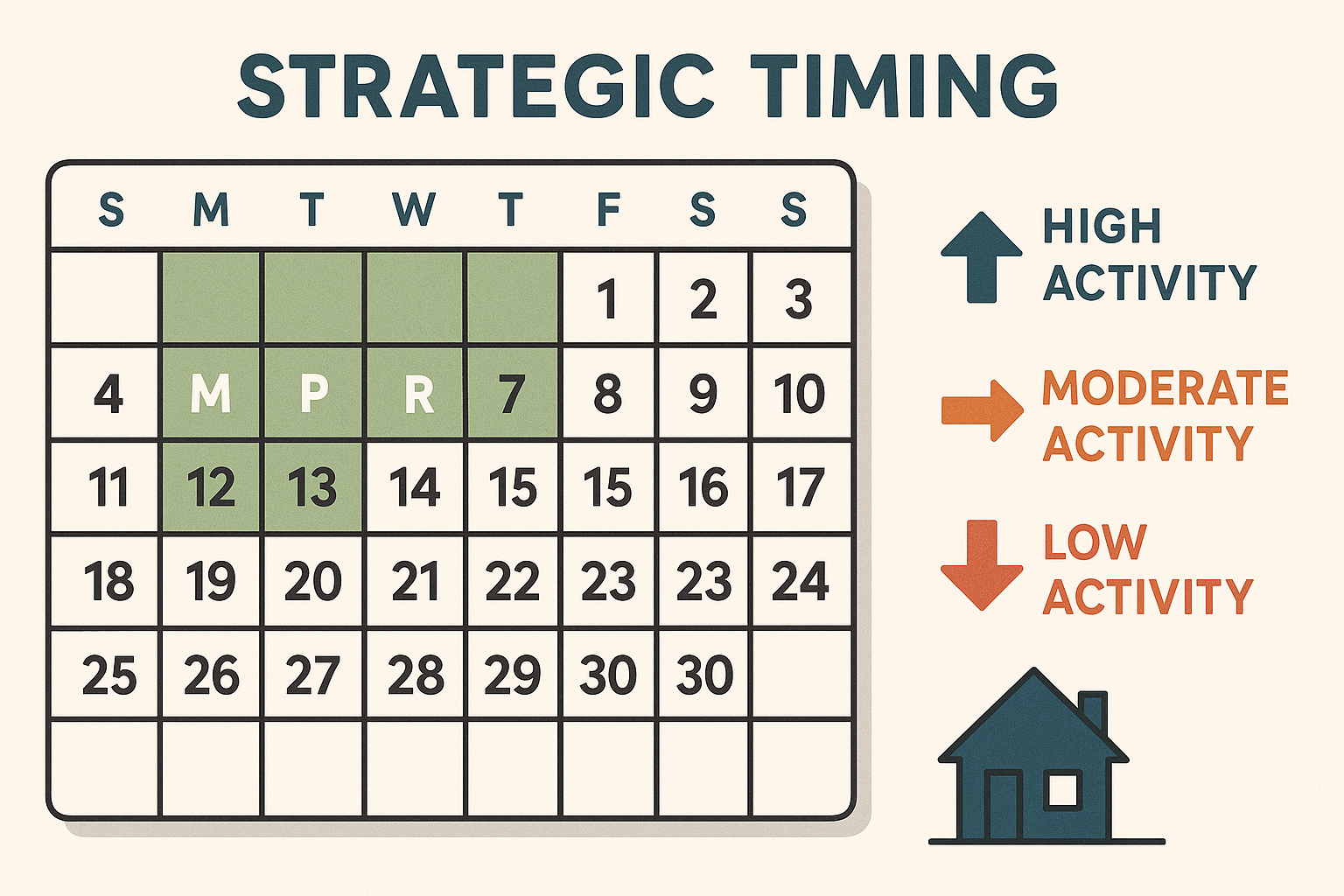
Choosing Education That Sets You Apart
While price is often the primary consideration when selecting real estate education, the quality of exam preparation, ongoing educational opportunities, and industry connections provided by different schools can significantly impact your long-term success. The cheapest option often costs more in missed opportunities and inadequate preparation.
The True Cost of Cheap Education
Selecting an education provider based solely on price often leads to inadequate exam preparation, limited ongoing learning opportunities, and missed networking connections. The most expensive option isn’t always best, but understanding the full value proposition of different providers helps you make a strategic investment in your career foundation rather than just checking a licensing requirement box.
I get it – you want to minimize upfront costs when you’re not earning real estate income yet. But choosing education based purely on price is buying the cheapest tools for a job you plan to do professionally. It might work, but it’ll probably cost you more in the long run.
Michigan requires all applicants take a 40-hour Michigan real estate pre-licensing course from an approved educator with specific requirements for civil rights law and equal opportunity housing education.
Interview recent graduates from different education providers about their actual experience. How many attempts did it take them to pass the state exam? How well did their education prepare them for their first transaction? Did they feel confident handling contracts and negotiations, or did they have to learn everything on the job?
Cheaper programs often use outdated materials, provide minimal instructor interaction, and focus on memorization rather than practical application. You might save $500 on education but spend months struggling with concepts that a better program would have made clear.
Look at pass rates, but dig deeper. What support do they provide if you don’t pass on the first attempt? Do they offer additional review sessions? How accessible are instructors when you have questions? These factors matter more than the initial price difference.
Consider the networking opportunities different providers offer. Some schools have strong connections with local brokerages, provide job placement assistance, or host events where you can meet industry professionals. These connections can be worth thousands in future business opportunities.
Building Your Continuing Education Strategy Early
Choosing an education provider that offers strong continuing education creates a long-term learning relationship that supports your career development beyond basic licensing. This strategic approach ensures you have access to advanced courses in your planned specialization area and maintains consistency in your educational experience as you grow professionally.
Your real estate education doesn’t end when you pass the licensing exam – it’s just beginning. Michigan requires 18 hours of continuing education every 3 years including specific requirements for legal education and fair housing courses.
Review the continuing education catalogs of potential providers before choosing your initial licensing program. Look for advanced courses in your planned specialization area, emerging technology training, and business development programs. Choosing a provider with strong continuing education options creates a pathway for ongoing professional development.
Some education providers offer alumni networks, advanced certification programs, and exclusive training opportunities that aren’t available to the general public. These resources become more valuable as your career progresses and you’re looking to differentiate yourself from other experienced agents.
Consider providers that offer both online and in-person options for continuing education. Your learning preferences might change as you gain experience, and having flexibility in how you complete ongoing requirements makes it easier to maintain your education while building your business.
The best education providers become long-term partners in your professional development, rather than just stepping stones to getting licensed. This relationship can provide ongoing support, advanced training, and networking opportunities throughout your career.
Mastering the Exam Psychology Game
The Michigan real estate exam tests more than knowledge – it evaluates your ability to think as a practicing agent under pressure. Success requires developing scenario-based thinking skills, preparing for the psychological stress of the testing environment, and understanding that the exam measures practical application of concepts rather than simple memorization of facts.
Training Your Brain to Think Like a Professional
The state exam uses scenario-based questions that require you to apply knowledge in realistic situations rather than simply recalling facts. Developing this thinking pattern involves creating practical applications for every concept you study and practicing explanations to non-real estate people to ensure true understanding rather than surface-level memorization.
The Michigan real estate exam isn’t testing whether you memorized the textbook – it’s testing whether you can think as a licensed professional when faced with real-world scenarios. This requires a different type of preparation than most people expect.
The exam requires candidates to pass both the state and national portions of the real estate salesperson licensing examination by earning a score of 70% or higher, but success depends on understanding application rather than memorization.
For every topic you study, create three realistic scenarios where that knowledge would apply. If you’re learning about agency relationships, don’t just memorize the definitions. Think through situations: “A buyer asks me to show them a house I have listed – how do I handle dual agency disclosure?” “A seller wants to know if they have to accept a full-price offer with unusual terms – what’s my fiduciary duty here?”
Practice explaining these scenarios to friends or family members who aren’t in real estate. If you can’t explain a concept in simple terms to someone outside the industry, you don’t understand it well enough to apply it under exam pressure.
The exam writers know the common misconceptions and mistakes new agents make. They craft questions that seem straightforward but require you to think through the implications of different choices. Surface-level knowledge won’t cut it – you need to understand the “why” behind every rule and regulation.
Create a study group with other licensing candidates and practice teaching concepts to each other. Teaching forces you to organize your knowledge and identify gaps in your understanding. Plus, explaining concepts out loud prepares you for the mental process you’ll use during the actual exam.
Conquering Test Day Stress Before It Conquers You
Even well-prepared candidates can fail due to test anxiety and unfamiliar testing environments. Stress inoculation involves taking practice exams under timed conditions in unfamiliar locations, visiting the actual testing center beforehand, and developing mental strategies for managing pressure during the exam itself.
You can know the material backwards and forwards, but if test anxiety kicks in, all that preparation becomes useless. I’ve seen brilliant people fail the real estate exam because stress clouded their thinking, rather than because they didn’t know the answers.
Start taking practice exams under realistic conditions early in your preparation. Set a timer, eliminate distractions, and take tests in unfamiliar environments – coffee shops, libraries, anywhere that’s not your comfortable study space. This builds your ability to focus and think clearly in less-than-ideal conditions.
Visit the actual testing center before your exam day. Know where to park, how long it takes to get there, what the check-in process looks like. Eliminate as many unknowns as possible so your mental energy on test day goes toward answering questions, rather than managing logistics.
Develop a pre-exam routine that calms your nerves and focuses your mind. This might include specific breathing exercises, positive self-talk, or reviewing key concepts one final time. Practice this routine during your practice exams so it becomes automatic.
During the exam, read each question completely before looking at the answers. Many questions include important details in the middle or end that change the correct answer. If you’re unsure about a question, eliminate obviously wrong answers first, then choose from the remaining options.
Remember that you don’t need a perfect score – you just need to pass. Don’t allow difficult questions to derail your confidence for the rest of the exam. Mark challenging questions and come back to them if time permits, but keep moving forward.

Surviving Your First Year When Others Don’t
The first year as a real estate agent is notoriously challenging, with most new agents failing due to unrealistic financial expectations, inadequate client acquisition systems, and slow professional development. Success requires honest financial planning for delayed income, systematic approaches to generating and converting leads, and accelerated learning strategies that help you compete with experienced agents quickly.
The Real Financial Picture You Need to Face
Most new agents underestimate how long it takes to generate consistent income, leading to financial stress that forces them out of the business before they can succeed. Realistic financial planning involves preparing for 18 months of expenses, identifying interim revenue sources within real estate, and understanding that your first few transactions may take much longer to close than expected.
Real estate agents in Michigan must be at least 18 years old to obtain their license, and the state requires an $88 application fee when submitting your licensing application through the MiPLUS system.
The 18-Month Reality Check
The timeline from starting your real estate career to achieving consistent monthly income is typically much longer than new agents expect. Planning for 18 months of expenses provides the financial cushion necessary to build your business properly without the desperation that leads to poor decision-making and client relationships.
Nobody wants to hear this, but I’m going to tell you anyway: plan for 18 months before you’re earning consistent income from real estate. Not 6 months, not “a few months to get established” – 18 months.
Here’s why this timeline is realistic: Month 1-3, you’re getting licensed and finding a brokerage. Month 4-6, you’re learning systems and generating your first leads. Month 7-9, you’re working with your first serious clients. Month 10-12, you’re hopefully closing your first transactions. Month 13-18, you’re building consistency and repeat business.
This doesn’t mean you won’t earn anything for 18 months – you might close deals earlier. But planning for the longer timeline prevents the desperation that kills new agent careers. When you’re worried about paying rent, you make poor decisions. You take bad clients, agree to unrealistic demands, or jump to different brokerages chasing quick fixes.
Calculate your monthly expenses and multiply by 18. If that number scares you, consider starting real estate part-time while maintaining other income, or identify specific strategies to accelerate your timeline. But don’t kid yourself about how long building a sustainable real estate business actually takes.
This financial cushion also allows you to invest in your business properly. You can afford professional photography, marketing materials, and continuing education without stressing about immediate returns. You can turn down difficult clients who aren’t worth the headache because you’re not desperate for any commission.
Creating Multiple Revenue Streams While You Build
Diversifying your income within the real estate industry can provide financial stability while you build your sales business. Opportunities include rental property management, real estate photography, home staging, or buyer’s agent referral work that can generate interim income while developing skills and connections that support your long-term goals.
While you’re building your sales business, look for other ways to earn income within real estate. These interim revenue sources can bridge the gap while providing valuable experience and connections.
Rental property management offers steady monthly income and teaches you about property maintenance, tenant relations, and investment analysis. Many property owners need help but can’t afford full-service management companies. You can offer basic services including tenant screening, rent collection, and maintenance coordination.
Real estate photography is in high demand, especially if you developed these skills during licensing. Many agents need better photos but don’t want to hire expensive photographers for every listing. You can offer photography services to other agents while building relationships and learning about different properties.
Home staging consultation provides another income stream while developing expertise that benefits your own listings. Many sellers need staging help but can’t afford full-service staging companies. You can offer consultation and basic staging services.
Consider becoming a buyer’s agent for experienced listing agents who need help with their buyer clients. This provides transaction experience, mentorship opportunities, and referral income while you’re building your own client base.
These activities aren’t distractions from building your real estate business – they’re complementary income sources that develop your skills, expand your network, and provide financial stability during your growth phase.
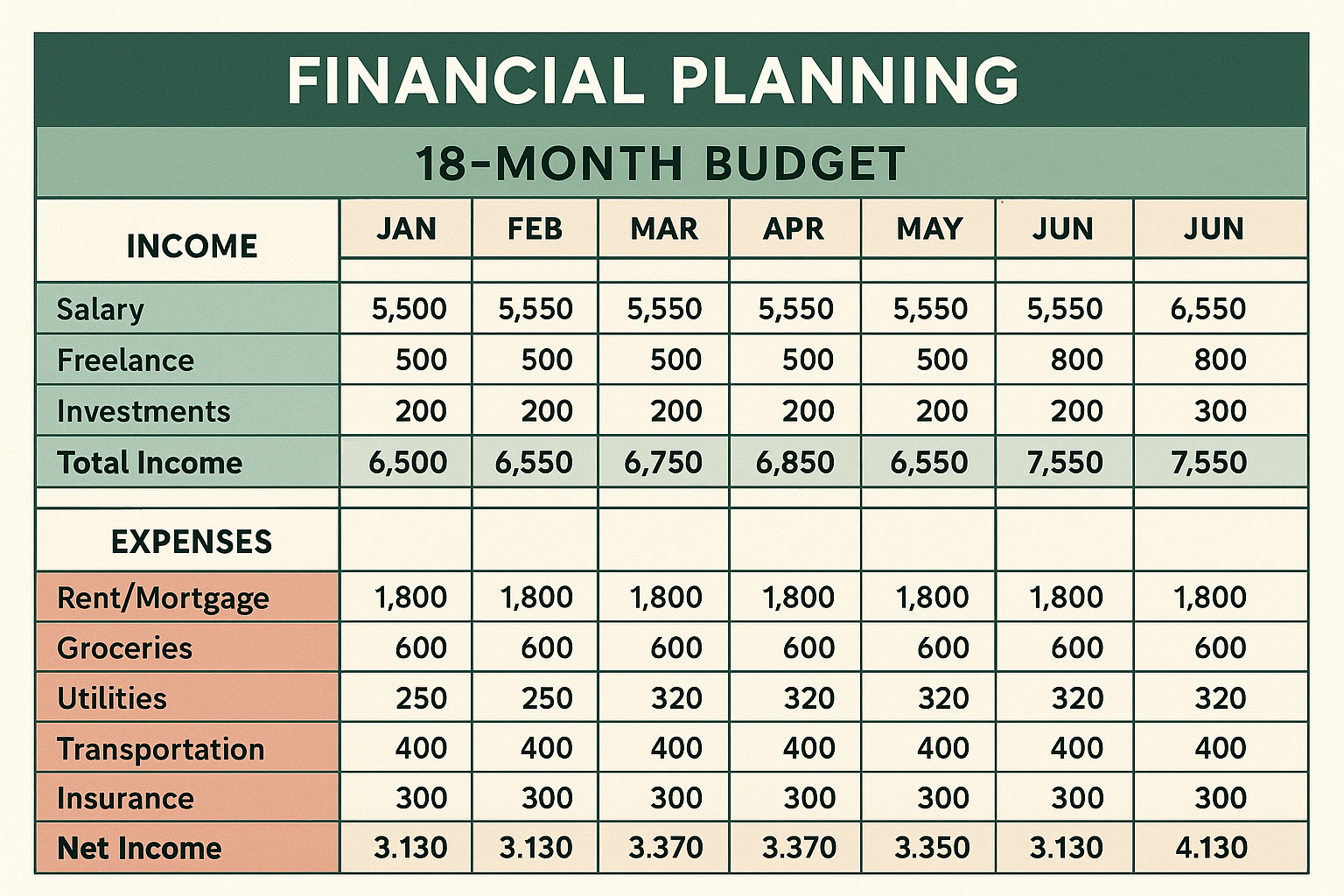
Building a Client Machine That Actually Works
Successful real estate agents have systematic approaches to generating leads and converting them into clients, rather than relying on random networking or hoping for referrals. This requires activating your sphere of influence strategically, implementing geographic farming techniques, and creating repeatable processes that generate predictable results over time.
Current market conditions are creating unique opportunities for new agents, with recent data showing that approximately 40% of homes that went under contract had an accepted offer within the first two weeks of hitting the market according to Redfin, emphasizing the importance of being prepared to move quickly in today’s competitive environment.
Turning Your Network into Your Sales Force
Your existing relationships represent your most valuable source of potential clients and referrals, but most agents fail to activate these connections systematically. Success requires creating contact management systems that track every relationship, providing consistent value before asking for business, and maintaining meaningful connections without appearing overly promotional.
Your sphere of influence – everyone you know personally – will generate more business than any other marketing strategy if you work it systematically. The problem is, most agents either ignore their sphere or approach it in ways that damage relationships.
Create a contact management system that tracks every person you know, their real estate timeline, and your last meaningful interaction. This isn’t about being manipulative – it’s about being systematic in maintaining relationships that matter to you personally and professionally.
Set up a system to provide value before asking for business. Send monthly market updates that include neighborhood-specific information, seasonal home maintenance tips, or local market insights. Share information that’s genuinely useful, rather than promotional material about your services.
The key is consistency without being annoying. A monthly email with valuable local information keeps you top-of-mind without overwhelming people. Include personal updates occasionally – new certifications you’ve earned, community involvement, or market trends you’re seeing.
Track responses and engagement. Who opens your emails? Who responds with questions? Who shares your content? These people are your warmest prospects and deserve more personal attention.
When people in your sphere are ready to buy or sell, they should think of you first because you’ve been consistently helpful and professional. But more importantly, they should feel comfortable referring you to their friends and family because they trust your expertise and approach.
Dominating Your Geographic Farm
Geographic farming involves becoming the recognized real estate expert in a specific neighborhood through consistent, valuable presence and communication. This strategy requires choosing the right area, researching market conditions thoroughly, and creating systematic communication plans that position you as the local market authority.
Geographic farming – focusing intensively on a specific neighborhood – is one of the most reliable ways to build a sustainable real estate business. But most agents do it wrong by choosing areas randomly or communicating inconsistently.
Choose a neighborhood within 15 minutes of your home with 200-500 houses. This size is manageable for consistent communication but large enough to generate regular business. Look for areas with moderate turnover – stable enough to build relationships, but active enough to generate opportunities.
Research everything about your chosen area: recent sales, price trends, average days on market, seasonal patterns, neighborhood issues, planned developments, school district changes, and local government decisions that might affect property values. Become genuinely knowledgeable about factors that influence property values in this specific area.
Create a monthly communication plan for every homeowner in your farm area. This might include printed newsletters, door hangers with market updates, or targeted social media content. The key is providing information that’s specifically relevant to their neighborhood, rather than generic real estate advice.
Track your farming activities and results. How many people respond to your communications? How many listing appointments do you get? How many referrals come from your farm area? This data helps you refine your approach and justify the time investment.
Geographic farming takes 12-18 months to generate consistent results, but once established, it provides a steady stream of listings and referrals. People in your farm area will think of you first when they’re ready to move because you’ve consistently demonstrated knowledge about their specific neighborhood.
Jennifer chose a 300-home subdivision in Novi as her geographic farm area. She created monthly market reports specific to that neighborhood, showing average sale prices, days on market, and upcoming listings. She hand-delivered these reports quarterly and mailed them the other months. After 14 months, she had listed 8 homes in the subdivision and received 12 referrals from residents who knew her as “the neighborhood expert.” Her farm area now generates 60% of her annual income.
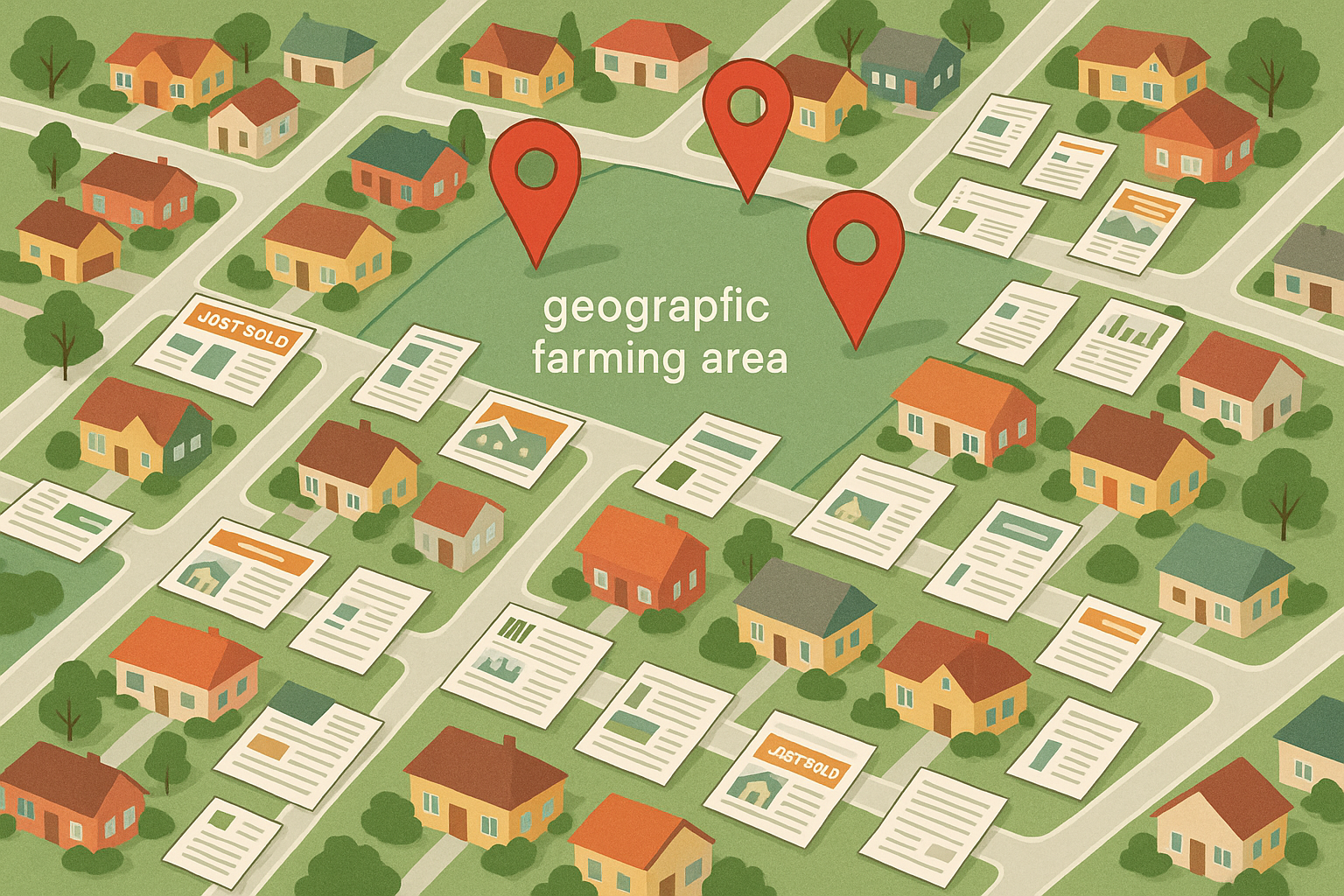
Fast-Tracking Your Expertise Development
New agents need to compete with experienced professionals from day one, which requires accelerated learning strategies and strategic relationship building. This involves structuring mentor relationships that provide value to both parties, creating systems to capture and analyze insights from every transaction, and developing expertise faster than traditional trial-and-error approaches allow.
Building Your Personal Board of Advisors
Mentor relationships with experienced agents can dramatically accelerate your learning curve, but these relationships must be structured to provide value to both parties rather than one-sided requests for help. Success involves identifying mentors in different market segments, offering specific services in exchange for guidance, and maintaining these relationships as your career progresses.
Don’t just ask experienced agents to “mentor” you – that’s vague and one-sided. Instead, identify three successful agents in different market segments and offer specific value in exchange for guidance and market insights.
Look for agents who are successful but might benefit from help with social media management, open house assistance, research support, or administrative tasks. Approach them with specific offers: “I’d like to learn about luxury home marketing. Could I help with your social media content in exchange for shadowing you on listing appointments?”
This approach works because you’re solving a problem for them while getting the learning experience you need. Successful agents are often overwhelmed with business and appreciate competent help, even from new agents.
Structure these relationships with clear expectations. How much time will you provide? What specific tasks will you handle? What learning opportunities do you want in return? Having clear agreements prevents misunderstandings and ensures both parties benefit.
Maintain these relationships as your career progresses. Your mentors become referral sources, collaboration partners, and ongoing advisors. The agents who helped you when you were new will often send you business when you’re established because they know your work ethic and integrity.
Document what you learn from each mentor. Different agents have different strengths – one might excel at pricing strategies, another at negotiation, a third at marketing. Capture their insights and approaches so you can apply them in your own business.
Creating Your Transaction Learning Laboratory
Every transaction contains valuable lessons that can improve your future performance, but most agents don’t systematically capture and analyze these insights. Creating a post-transaction analysis system helps you identify patterns, improve your processes, and avoid repeating mistakes while building a knowledge base that accelerates your expertise development.
Most agents finish a transaction, celebrate the commission, and move on to the next deal without capturing the lessons learned. This is a huge missed opportunity for accelerated learning and business improvement.
Develop a post-transaction analysis template that captures what worked, what didn’t, and lessons learned from every deal. Include questions: What marketing strategies generated the most interest? Which negotiation tactics were most effective? What client communication could have been better? What would you do differently next time?
Review these analyses monthly to identify patterns and improvement opportunities. Are you consistently struggling with the same issues? Are certain marketing approaches consistently outperforming others? Are there client types or transaction types that you handle particularly well or poorly?
This systematic approach to learning helps you improve faster than agents who rely on trial and error. You’re extracting maximum learning value from every experience, rather than just gaining experience.
Share insights with your mentor network and peer groups. Teaching others what you’ve learned reinforces your own knowledge and often leads to valuable discussions about different approaches and strategies.
Use this knowledge base to refine your processes, improve your marketing, and make better strategic decisions. After analyzing 10-15 transactions, you’ll have insights that many agents with years of experience lack because they never systematically studied their own performance.

The Technology Revolution Changing Everything
Modern real estate success depends heavily on technology mastery, yet most traditional training programs barely address these critical skills. Today’s agents must build integrated digital marketing systems, manage client relationships at scale through technology, and use data analytics to make strategic business decisions. These technological capabilities often determine whether new agents thrive in a competitive market or struggle to generate consistent business.
Creating Your Digital Marketing Empire
Building an effective online presence requires more than just having social media accounts – it demands systematic content creation, strategic lead generation funnels, and proactive reputation management. These digital marketing systems can generate leads automatically while you focus on serving clients, but they require upfront investment in learning and consistent execution to produce results.
Building Your Content Creation Machine
Consistent, valuable content positions you as a local market expert and generates leads over time, but most agents struggle with content creation because they lack systematic approaches. Success requires developing content calendars focused on local market topics, batch-creating content during slower periods, and repurposing content across multiple platforms to maximize efficiency.
Content marketing isn’t optional anymore – it’s how potential clients evaluate your expertise before they ever meet you. But most agents approach content creation haphazardly, posting randomly when they remember or have time.
Create a 12-month content calendar focused on local market topics that your potential clients actually care about. Include seasonal buying and selling tips, neighborhood spotlights, market analysis, home maintenance advice, and local community events that affect property values.
Batch-create content during your pre-license period and slower market times so you’re not scrambling to post something when you’re busy with clients. Spend one day per month creating content for the entire month – write blog posts, take photos, record videos, and schedule everything in advance.
Focus on topics that demonstrate your local market knowledge rather than generic real estate advice that anyone could find online. “Spring Home Maintenance Tips for Michigan Homeowners” is more valuable than “5 Tips for First-Time Buyers” because it shows specific knowledge about local conditions.
Repurpose content across multiple platforms. A neighborhood market analysis can become a blog post, social media posts, an email newsletter article, and a video presentation. This maximizes the value of your content creation time while reaching different audiences who prefer different content formats.
Track which content generates the most engagement, leads, and client inquiries. Double down on topics and formats that resonate with your audience while eliminating content that doesn’t provide results.
Mastering the Social Media Conversion Game
Social media marketing for real estate requires more than posting pretty house pictures – it demands strategic lead generation systems that move followers through a structured journey from awareness to client relationship. This involves creating lead magnets, developing email nurture sequences, and building conversion funnels that turn social media engagement into actual business.
Posting on social media without a conversion strategy is just expensive entertainment. You need systems that turn social media followers into leads, and leads into clients.
Set up Facebook and Instagram business accounts with clear lead magnets – valuable resources that people will exchange their contact information to receive. A “First-Time Homebuyer’s Guide to Michigan” or “Seller’s Checklist for Maximum Home Value” works better than generic real estate information.
Create email nurture sequences that provide ongoing value to people who download your lead magnets. Don’t immediately start selling – provide market insights, home maintenance tips, and local community information that keeps you top-of-mind when they’re ready to buy or sell.
Use Facebook and Instagram advertising to promote your lead magnets to specific audiences in your target market. You can target people by location, age, interests, and even behaviors including “likely to move” or “interested in real estate.”
Track your conversion metrics: How many people see your posts? How many click through to your lead magnets? How many provide their contact information? How many eventually become clients? This data helps you optimize your social media strategy for actual business results rather than just engagement metrics.
Engage authentically with your audience. Respond to comments, answer questions, and participate in local community groups where your potential clients spend time online. Social media success comes from building relationships, rather than just broadcasting information.

Protecting Your Digital Reputation Before It’s Too Late
Online reputation management requires proactive strategies rather than reactive damage control. This involves claiming and optimizing your Google My Business profile, setting up monitoring systems for mentions of your name across review platforms, and creating systematic processes to request reviews from satisfied clients immediately after successful transactions.
Your online reputation will make or break your real estate career, but most agents don’t think about reputation management until they get their first negative review. By then, it’s much harder to recover.
Claim your Google My Business profile immediately and optimize it completely. Include professional photos, detailed business information, and regular posts about your market area and services. Google My Business is often the first thing potential clients see when they search for your name.
Set up Google Alerts and other monitoring tools to track mentions of your name across the internet. You want to know immediately when someone reviews you, mentions you in social media, or discusses your services online so you can respond appropriately.
Create a systematic process for requesting reviews from satisfied clients. The best time to ask is immediately after a successful closing when emotions are positive and the experience is fresh in their minds. Make it easy by providing direct links to your Google, Facebook, and Zillow profiles.
Respond professionally to all reviews, both positive and negative. Thank people for positive reviews and address concerns in negative reviews professionally and constructively. Potential clients read your responses to reviews as much as the reviews themselves.
Build a library of positive testimonials, case studies, and client success stories that you can use in marketing materials and on your website. These proactive reputation-building materials help establish credibility before potential clients even look at review sites.
Managing Relationships at Scale
Technology enables real estate agents to maintain meaningful relationships with hundreds of contacts without losing the personal touch that drives referrals and repeat business. This requires sophisticated CRM systems, automated communication sequences that feel personal, and streamlined transaction management processes that ensure nothing falls through the cracks during busy periods.
Automating Personal Touch at Scale
Customer relationship management systems allow you to maintain systematic communication with large numbers of contacts while preserving the personal relationships that generate referrals. Success requires choosing the right CRM platform, setting up automated drip campaigns for different contact types, and including personal touches that make automated communication feel genuine.
You can’t build a successful real estate business by manually tracking hundreds of relationships in your head or on spreadsheets. You need systems that help you maintain personal connections at scale.
Choose a real estate-specific CRM system including Chime, Follow Up Boss, or Wise Agent that’s designed for the unique needs of real estate professionals. These platforms understand real estate sales cycles, integrate with MLS systems, and include features specifically for agent workflows.
Set up automated drip campaigns for different types of contacts: past clients, sphere of influence, new leads, and prospects at different stages of the buying or selling process. Each group needs different types of communication at different frequencies.
Include personal touches in your automated systems. Set up birthday reminders, home purchase anniversary dates, and notes about personal interests or family situations. When the system reminds you it’s someone’s birthday, send a personal text or call rather than an automated email.
Track engagement with your automated communications. Who opens emails? Who responds to texts? Who clicks through to your content? This data helps you identify your warmest prospects and adjust your communication frequency and content for different segments.
Use your CRM to track all interactions with each contact – phone calls, emails, meetings, transactions, and referrals. This complete relationship history helps you provide better service and identify opportunities for additional business or referrals.
Streamlining Transaction Chaos
Managing multiple real estate transactions simultaneously requires systematic workflows and technology tools that ensure nothing falls through the cracks. Transaction management platforms help organize required documents, track important deadlines, and coordinate communication between all parties involved in complex real estate deals.
Real estate transactions involve dozens of documents, multiple deadlines, and coordination between buyers, sellers, agents, lenders, inspectors, appraisers, and attorneys. Without systematic transaction management, important details get missed and deals fall apart.
Research transaction management platforms used by successful agents in your target brokerage. Some brokerages provide these tools, while others expect agents to choose their own systems. Popular options include Dotloop, DocuSign, and SkySlope.
Create detailed checklists for each stage of the buying and selling process, including all required Michigan-specific documents and typical deadlines. These checklists ensure you don’t miss important steps even when managing multiple transactions simultaneously.
Set up automated reminders for critical deadlines including inspection periods, financing contingencies, and closing dates. Missing these deadlines can kill transactions and damage your professional reputation.
Use digital document management to keep all transaction-related documents organized and accessible. This is especially important when working with multiple clients and need to quickly access specific information during negotiations or problem-solving.
Communicate proactively with all parties throughout each transaction. Regular updates about progress, potential issues, and next steps keep everyone informed and reduce the stress that can derail transactions.
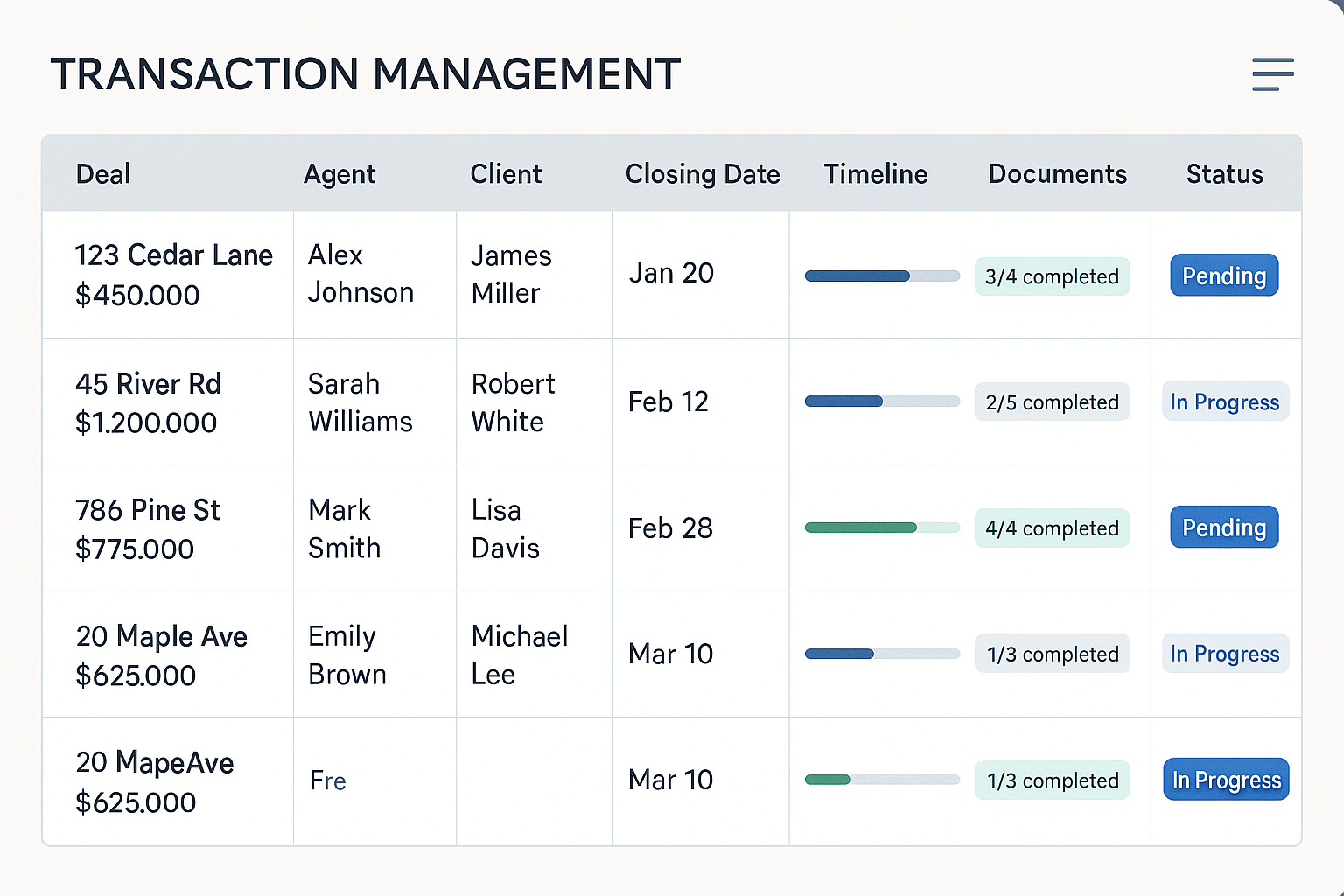
Making Data-Driven Decisions That Count
Successful real estate agents use market data and personal performance analytics to make strategic business decisions rather than relying on intuition alone. This involves setting up automated market analysis systems, tracking personal performance metrics, and using data insights to optimize marketing strategies, pricing recommendations, and business development activities.
Automating Your Market Intelligence
Staying current with market trends and conditions requires systematic data collection and analysis rather than casual observation. Setting up automated market reports and analysis systems helps you identify opportunities, provide better client advice, and position yourself as a knowledgeable market expert who bases recommendations on data rather than opinions.
Your ability to analyze and interpret market data separates you from agents who rely on gut feelings and outdated information. But manually tracking market conditions across multiple neighborhoods is time-consuming and prone to errors.
Subscribe to MLS data feeds and set up automated market reports for your target areas. These reports should track inventory levels, average sale prices, days on market, and price trends over time. Many MLS systems offer automated report generation that can email you weekly or monthly updates.
Create monthly market analysis templates that you can quickly customize for different neighborhoods or client presentations. Include charts showing price trends, inventory levels, and seasonal patterns that help clients understand current market conditions.
Use this data to identify opportunities: neighborhoods where inventory is low and prices are rising, properties that have been on the market longer than average, or market segments that are underserved by other agents.
Share your market insights through your content marketing and client communications. Agents who can explain market conditions with specific data rather than general observations build more credibility with clients and referral sources.
Stay informed about broader economic factors that affect real estate: interest rate trends, employment data, population growth, and development plans that might impact your market areas.
Tracking What Actually Drives Your Success
Most real estate agents can’t identify which activities generate the highest return on investment because they don’t systematically track their performance metrics. Creating simple tracking systems for daily activities and their outcomes helps you identify the most effective lead generation strategies, optimize your time allocation, and make data-driven decisions about business development investments.
Most agents work hard but can’t tell you which activities actually generate business. Without tracking your performance metrics, you’re making business decisions based on feelings rather than facts.
Create a simple tracking system for your daily activities: calls made, emails sent, appointments set, contracts written, and their outcomes. This doesn’t need to be complicated – a basic spreadsheet or simple app can capture the essential data.
Track your lead sources: Where do your best clients come from? Which marketing activities generate the most qualified leads? How long does it typically take to convert a lead into a client? This information helps you focus your marketing efforts on the most effective strategies.
Monitor your conversion rates at each stage of your sales process: What percentage of leads become appointments? What percentage of appointments become clients? What percentage of listings sell within your target timeframe? Identifying weak points in your process helps you improve overall performance.
Review your metrics weekly to identify trends and opportunities for improvement. Are certain types of marketing consistently outperforming others? Are you spending too much time on activities that don’t generate results? Are there patterns in your most successful transactions?
Use this data to make strategic decisions about where to invest your time and money. If geographic farming generates better results than online advertising, shift more resources to farming. If certain types of clients are more profitable and easier to work with, focus your marketing on attracting more of them.
With current market conditions showing Real estate agent commissions typically total 5.86 percent of a home’s purchase price in Michigan, according to data from Clever Real Estate, understanding your performance metrics becomes even more critical for maximizing your earning potential.
|
Performance Metric |
Tracking Method |
Review Frequency |
Action Trigger |
|---|---|---|---|
|
Lead Sources |
CRM tags/categories |
Weekly |
<20% from top source |
|
Conversion Rates |
Pipeline tracking |
Monthly |
<10% lead-to-client |
|
Marketing ROI |
Cost per lead |
Monthly |
>$50 per qualified lead |
|
Transaction Timeline |
Deal tracking |
Per transaction |
>45 days average |
|
Client Satisfaction |
Post-close surveys |
Per transaction |
<9/10 average rating |
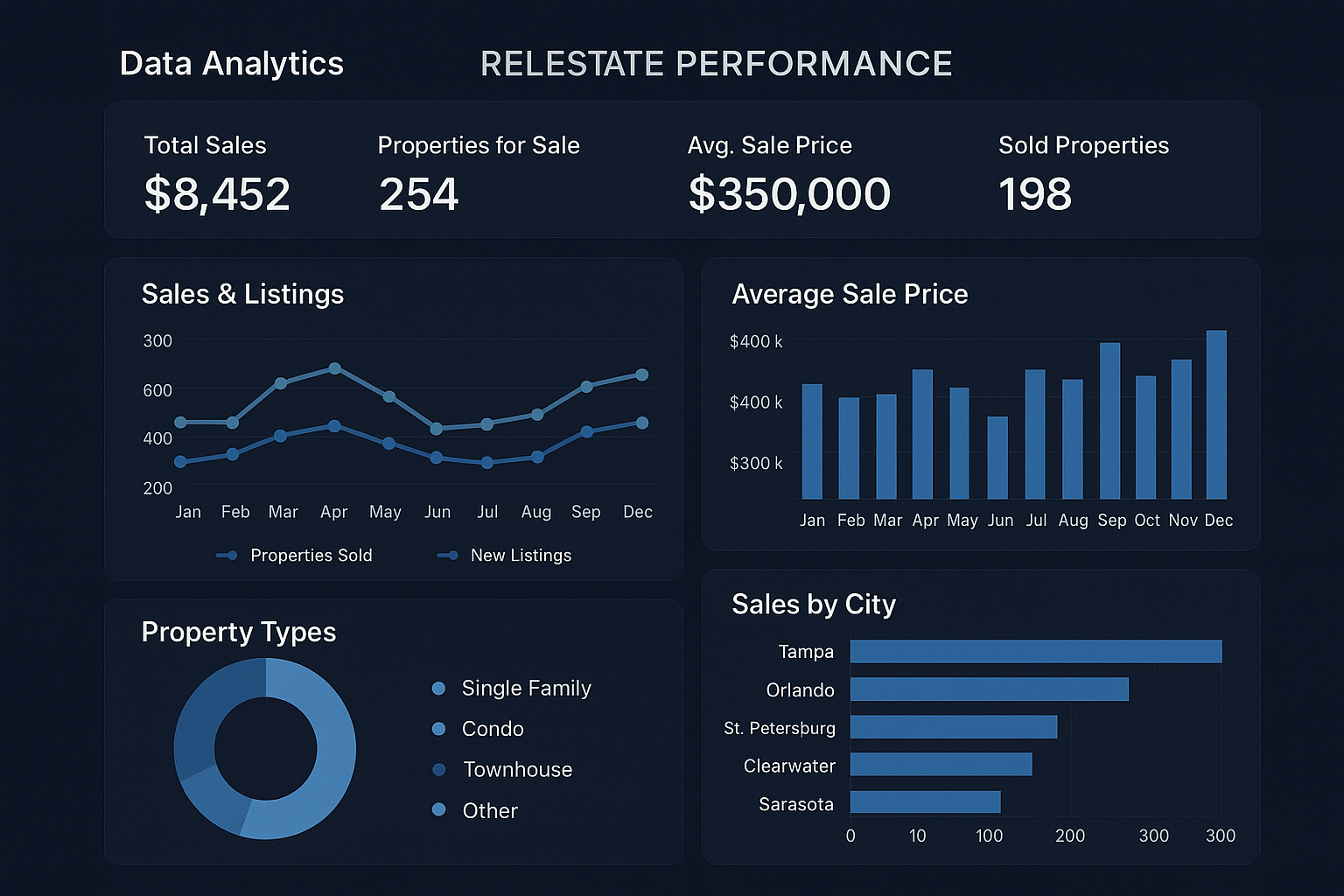
How ValidGrad Supports Your Professional Foundation
As you build your real estate career in Michigan, maintaining professional credibility becomes crucial for client trust and business development. Your educational background often plays a key role in your marketing materials, office displays, and professional biography. ValidGrad understands that life circumstances – whether it’s relocating for better market opportunities, office damage, or simple document misplacement – can put your important credentials at risk.
For real estate professionals, having multiple copies of educational documents serves several strategic purposes. You might want to display your degree prominently in your main office while keeping the original safely stored. Perhaps you’re expanding to multiple locations or need backup copies for professional presentations and marketing materials.
ValidGrad’s diploma replacement service provides quick turnaround times and attention to detail that busy real estate professionals need. Rather than navigating complex university bureaucracies when you should be focusing on clients and transactions, ValidGrad streamlines the process of obtaining professional-quality document replacements.
Whether you’re setting up your first office, expanding your business, or simply want to ensure your professional credentials are always accessible, ValidGrad offers the reliability and convenience that supports your career growth without administrative headaches. Understanding creative ways to display your credentials can help you create a professional environment that builds client confidence.
Pre-Exam Preparation Checklist:
-
Complete all 40 hours of required education
-
Take at least 5 practice exams under timed conditions
-
Visit the testing center location beforehand
-
Prepare required identification documents
-
Schedule exam for optimal time of day
-
Review Michigan-specific laws and regulations
-
Practice scenario-based questions daily for 2 weeks before exam
-
Develop and practice stress management routine
New Agent First 90 Days Action Plan:
-
Week 1-2: Complete brokerage onboarding and system training
-
Week 3-4: Set up CRM and begin sphere of influence outreach
-
Week 5-8: Choose and begin geographic farming area
-
Week 9-12: Schedule first mentor meetings and shadow experienced agents
-
Month 2: Launch social media presence and content calendar
-
Month 3: Conduct first market analysis presentations to sphere contacts

Final Thoughts
Becoming a successful real estate agent in Michigan requires much more than passing the licensing exam and joining a brokerage. The agents who thrive understand that success depends on psychological preparation, strategic timing, systematic relationship building, and technology mastery that most traditional training programs don’t address. Your first year will be challenging, but agents who approach the business with realistic expectations, solid financial planning, and systematic approaches to lead generation and client service can build sustainable, profitable careers.
The key is viewing your license as just the beginning of your professional development rather than the end goal, and consistently investing in the skills, relationships, and systems that separate successful agents from those who struggle or quit.
With Michigan’s evolving licensing landscape, including discussions about universal licensing reciprocity which would legally validate the occupational licenses earned by people in other states, the real estate profession continues to adapt and create new opportunities for qualified professionals.
The real estate industry will challenge everything you think you know about sales, relationships, and business building. Most new agents fail because they enter the field with unrealistic expectations and inadequate preparation for the psychological and financial realities of building a service business, rather than because they lack intelligence or motivation.
Your success won’t come from perfect market timing or lucky breaks – it’ll come from systematic preparation, consistent execution, and the patience to build relationships and expertise over time. The agents who thrive treat real estate as a professional practice that requires ongoing education, strategic thinking, and genuine commitment to serving clients’ best interests.
Start building your foundation now, before you’re licensed and desperate for income. Develop the relationships, skills, and systems that will support your business when you’re ready to launch. Most importantly, prepare financially and psychologically for the marathon of building a sustainable real estate career rather than the sprint of getting licensed and hoping for immediate success.
The Michigan real estate market offers tremendous opportunities for agents who approach the business strategically and professionally. Your success depends on how well you prepare for and execute the fundamentals that separate successful agents from the majority who struggle or quit, rather than on market conditions or luck.
